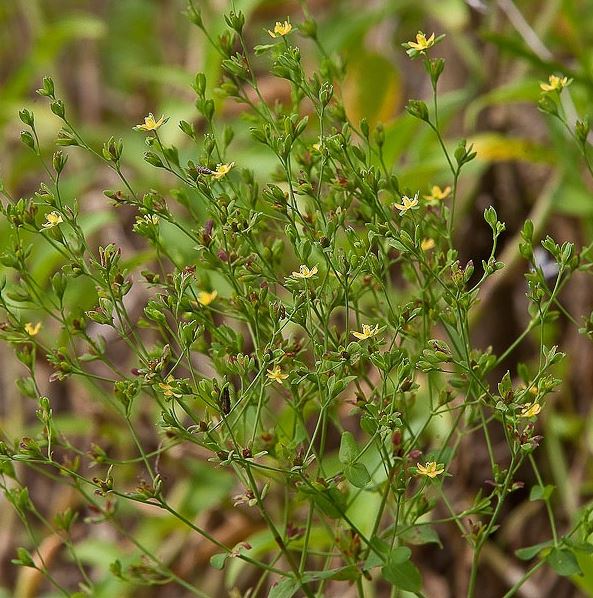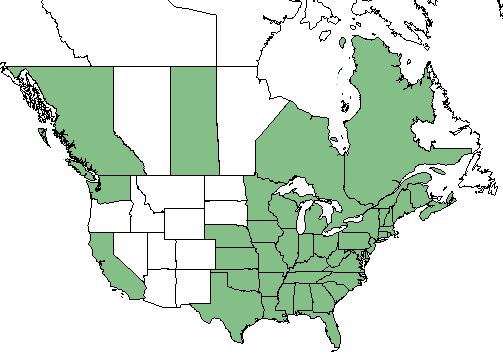Difference between revisions of "Hypericum mutilum"
(→Ecology) |
|||
| Line 32: | Line 32: | ||
==Ecology== | ==Ecology== | ||
===Habitat=== <!--Natural communities, human disturbed habitats, topography, hydrology, soils, light, fire regime requirements for removal of competition, etc.--> | ===Habitat=== <!--Natural communities, human disturbed habitats, topography, hydrology, soils, light, fire regime requirements for removal of competition, etc.--> | ||
| − | ''H. mutilum'' is found in bogs, fens, marshes, shores, and other wet habitats. <ref name= "Weakley 2015"> Weakley, A. S. (2015). Flora of the Southern and Mid-Atlantic States. Chapel Hill, NC, University of North Carolina Herbarium. </ref> | + | ''H. mutilum'' is found in bogs, fens, marshes, shores, and other wet habitats. <ref name= "Weakley 2015"> Weakley, A. S. (2015). Flora of the Southern and Mid-Atlantic States. Chapel Hill, NC, University of North Carolina Herbarium. </ref> Specimens have been collected from shallow water of marsh area, moist loamy sand, floodplains, small pond depression, and edge of river. <ref name = "FSU herbarium"> URL: http://herbarium.bio.fsu.edu. Last accessed: June 2018. Collectors: Loran C. Anderson, V. Craig, H. Roth, Bill Boothe, marcia Boothe, Leon Neel, R.K. Godfrey, R. Komarek, J.M. Kane, Annie Schmidt. States and counties: Florida (Gadsden, Leon, Liberty, Wakulla) Georgia (Thoms, Grady) South Carolina (Georgetown) </ref> |
===Phenology=== <!--Timing off flowering, fruiting, seed dispersal, and environmental triggers. Cite PanFlora website if appropriate: http://www.gilnelson.com/PanFlora/ --> | ===Phenology=== <!--Timing off flowering, fruiting, seed dispersal, and environmental triggers. Cite PanFlora website if appropriate: http://www.gilnelson.com/PanFlora/ --> | ||
''H. mutilum'' flowers April-July. <ref name= "PanFlora"> PanFlora Author: Gil Nelson URL: [http://www.gilnelson.com/PanFlora/ http://www.gilnelson.com/PanFlora/] Date Accessed: 5/22/18 </ref> | ''H. mutilum'' flowers April-July. <ref name= "PanFlora"> PanFlora Author: Gil Nelson URL: [http://www.gilnelson.com/PanFlora/ http://www.gilnelson.com/PanFlora/] Date Accessed: 5/22/18 </ref> | ||
Revision as of 13:39, 29 June 2018
Common name: dwarf St. Johnswort [1]
| Hypericum mutilum | |
|---|---|

| |
| Photo by John B | |
| Scientific classification | |
| Kingdom: | Plantae |
| Division: | Magnoliophyta - Flowering plants |
| Class: | Magnoliopsida - Dicots |
| Order: | Theales |
| Family: | Clusiaceae |
| Genus: | Hypericum |
| Species: | H. mutilum |
| Binomial name | |
| Hypericum mutilum L | |

| |
| Natural range of Hypericum mutilum from USDA NRCS Plants Database. | |
Contents
Taxonomic Notes
Synonyms: Hypericum mutilum L. var. latisepalum Fernald; Hypericum mutilum L. var. parviflorum (Willd.) Fernald
Varieties: none
Description
H. mutilum is an annual/perennial forb/herb native to Canada and North America and introduced in Hawaii. [1]
Distribution
H. mutilum is found in: the eastern half of the United States; Washington; California; the British Columbia, Saskatchewan, Ontario and Quebec regions of Canada; Hawaii. [1]
Ecology
Habitat
H. mutilum is found in bogs, fens, marshes, shores, and other wet habitats. [2] Specimens have been collected from shallow water of marsh area, moist loamy sand, floodplains, small pond depression, and edge of river. [3]
Phenology
H. mutilum flowers April-July. [4]
Fire ecology
H. mutilum is not fire resistant and has low fire tolerance. [1]
Conservation and Management
Cultivation and restoration
Photo Gallery
References and notes
- ↑ 1.0 1.1 1.2 1.3 USDA Plant Database https://plants.usda.gov/core/profile?symbol=HYMU
- ↑ Weakley, A. S. (2015). Flora of the Southern and Mid-Atlantic States. Chapel Hill, NC, University of North Carolina Herbarium.
- ↑ URL: http://herbarium.bio.fsu.edu. Last accessed: June 2018. Collectors: Loran C. Anderson, V. Craig, H. Roth, Bill Boothe, marcia Boothe, Leon Neel, R.K. Godfrey, R. Komarek, J.M. Kane, Annie Schmidt. States and counties: Florida (Gadsden, Leon, Liberty, Wakulla) Georgia (Thoms, Grady) South Carolina (Georgetown)
- ↑ PanFlora Author: Gil Nelson URL: http://www.gilnelson.com/PanFlora/ Date Accessed: 5/22/18